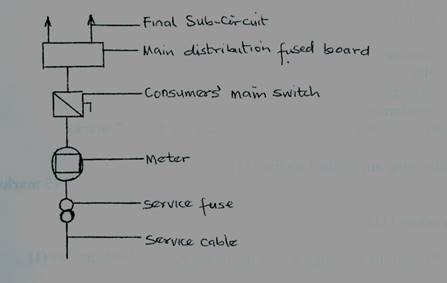This question was popular among the candidates and their performance was good.
In part (a), majority of the candidates were able to define an electric cell, state properties of an electric cell and draw diagram of a simple cell.
In part (b), majority of the candidates couldn’t sketch a line diagram showing the sequence of supply from the service cable of supply authority to a consumer’s final sub-circuit.
In part (c), majority of the candidates were able to list sources of funds for small business take-off.
The expected answers include:
3 (a) (i) An electric cell is a device that converts chemical energy into
electrical energy.
(ii) Primary cell
Secondary cell
(iii)

(c) (i) - Personal savings
- Loans from friends/family/relatives
- Trade Credit
- Loans from banks
- Loans from cooperative societies
- Overdraft from banks
- Grants from government
- Loans from government
- Grants from NGOs
(ii) Personal saving – an entrepreneur/electrician can start his business from
previous savings / he can use his personal income as initial capital.
Loans from friends/family/relatives – the entrepreneur/electrician can raise
capital by borrowing/collecting money or other valuables from friends/family/relatives with the condition that the money, would be refunded/repaid at a later date (with or without interest).
Trade Credit – the entrepreneur/electrician can obtain capital by purchasing/buying goods on credit from suppliers/producers/wholesalers.
/He can obtain capital by purchasing goods and paying at a later date.
Loans from banks – the entrepreneur/electrician can raise capital by borrowing/collecting money or other valuables from banks/financial institutions with the condition that the money, or such other valuables would be refunded/repaid at a later date (with or without interest).
Loans from cooperative society – the entrepreneur/electrician can raise capital
by borrowing/collecting money or other valuables from cooperative society with the condition that the money or such other valuables would be refunded/repaid at a later date (with or without interest).
Overdraft from banks – the entrepreneur/electrician can obtain permission from his banker to withdraw excess money/more money than he has in is account which will be repaid at a later date.
Grant from government – the entrepreneur/electrician can raise capital by collecting money or other valuables from government with the condition that the money or such other valuables would not be refunded/repaid.
Loans from government – the entrepreneur/electrician can raise capital by borrowing/collecting money or other valuables from the government with the condition that the money or other such valuables would be refunded/repaid at a later date with or without interest.
Grant from NGOs – the entrepreneur/electrician can raise capital by collecting money or other valuables from NGO with the condition that the money or other such valuables would not be refunded /repaid |



